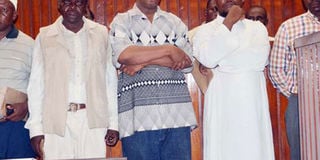Court upholds lifting of MRC ban

Mombasa Republican Council leaders arraigned in Mombasa Law Court on May 4, 2016 for the mention of their case. According to the Attorney-General and the Interior ministry, police investigations revealed that MRC is a potential threat to the peace and stability of the republic. PHOTO | KEVIN ODIT | NATION MEDIA GROUP
What you need to know:
- Dismissing the State’s appeal against a 2012 Mombasa High Court ruling that set aside the 2010 ban, the judges pointed out that the Internal Security minister erred in effecting it.
- The judges also dismissed an argument by the State to ignore a case in which the three officials sought orders to block the electoral commission from conducting elections in six Coastal counties.
The appellate court has upheld a decision to lift the ban on Kenya’s Coastal region secessionist group Mombasa Republican Council (MRC).
Court of Appeal Judges Daniel Musinga, William Ouko, Patrick Kiage, Kathurima M’Inoti and Jamila Mohammed ruled in Nairobi that the government’s ban on MRC six years ago was improperly effected, even if the group was considered a threat to national security.
Dismissing the State’s appeal against a 2012 Mombasa High Court ruling that set aside the 2010 ban, the judges pointed out that the Internal Security minister erred in effecting it.
“I am persuaded that the High Court came to the right conclusion, that the proscription of MRC by the Internal Security minister was unconstitutional,” ruled Justice Musinga.
According to the Attorney-General and the ministry, police investigations revealed that MRC is a potential threat to the peace and stability of the republic.
The State, through lawyer Mwangi Njoroge, had told the court that a report of the Commission of Inquiry into Post-Election Violence had also indicated that the group intended to disenfranchise upcountry people living at the Coast, and reclaim land owned by those perceived as outsiders.
It had also argued that MRC members had been arraigned in court over criminal offences besides calling for secession.
However, MRC’s former officials Randu Nzai Ruwa, Robert Charo Tukwatukwa and Nyae Ngao denied the claims, while the judges also ruled that the State had not provided adequate evidence to show that MRC engages in organised criminal activity.
“The effect of proscribing MRC was to deny the over 32,000 professed members thereof a right to assembly, political rights as well as fair administrative action,” said Justice Musinga.
“I do not think that there were sufficient reasons for doing so.”
On the secession debate, the judges ruled that a government cannot use force to shut down an agenda of secession and, therefore, the ban failed the test of an Executive decision taken in the name of protection of national security.
The judges also dismissed an argument by the State to ignore a case in which the three officials sought orders to block the electoral commission from conducting elections in six Coastal counties as well as privatisation of any government parastatal.





